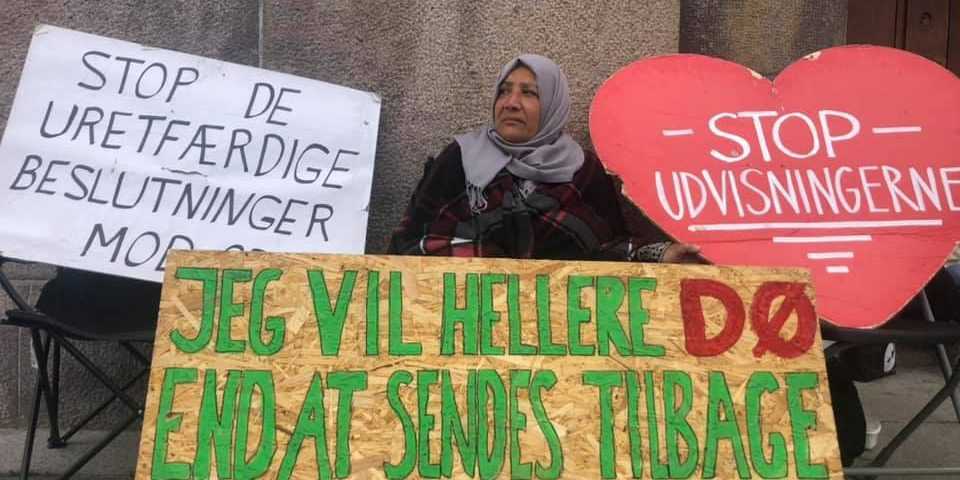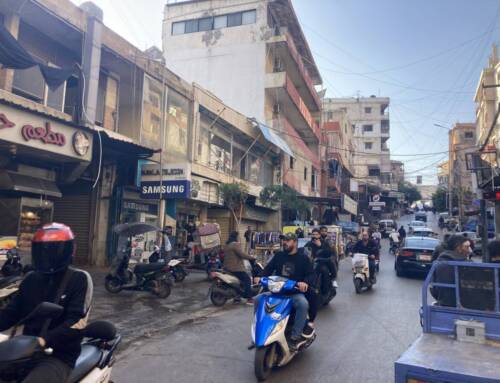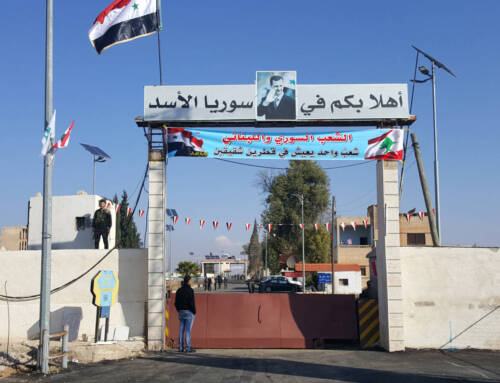Denmark’s policy to return Syrian refugees unleashes anxieties, splinters families
Syrian refugees in Denmark live in fear of losing their residency. While such a decision does not force them to return to Syria, Denmark's policy to hold them in return centers pushes refugees to return voluntarily, despite the high risks they face.
13 July 2021
AMMAN — In celebration of Denmark participating in the European Football Championship (EURO 2020) and reaching the semifinals against England on Wednesday, July 7, the Danish national team’s uniform all but dominated the country’s markets as everyone—citizens and residents alike—races to wear it.
But amid this joyous atmosphere, 34-year-old Syrian activist Yousef Bakdash, who lives in the city of Aarhus, felt “heartache,” as he said, for the first time since arriving in Denmark six years ago. He wished that his three-year-old son could participate in this event with other children “by wearing the team’s colors.” But “the lack of a sense of belonging to this community, and the feeling of not being welcome, stopped me from buying him a sports uniform,” Bakdash told Syria Direct. “That would seem strange, at odds with what we’re being subjected to.”
Bakdash feels under threat given the Danish Immigration Service’s refusal to renew the residencies of Syrian refugees from Damascus and its countryside, considering it “a safe area” to return to.
Although Bakdash is from Syria’s northwestern city of Aleppo, which the Danish government has not classified as a safe area of Syria for refugees to return to, he feels “threatened with deportation, because I hold protective residency and not political asylum.” Thus, he could be on the list of people whose residency is revoked if his city is designated safe, as Denmark has not recognized “my political activism, and has not taken into consideration my injury in 2012 while doing relief activity.”
Bakdash lost his right leg to an injury in a regime bombing that also killed his brother. He also lost his other brother “to a field execution after he tried to defect from the regime army, which refused to turn over his body to us.”
Should Copenhagen’s decisions one day force Bakdash to return, his life and those of other Syrian refugees in Denmark who opposed Assad will be threatened. Out of 35,000 Syrian refugees, “the Danish Immigration Service refused to renew 270 cases as of May, with some cases involving [the residencies of] more than one individual,” Assem Swaid, a member of the Syrian-Danish NGO Finjan, told Syria Direct. “Of the 270 cases, 86 were referred to the Refugee Appeals Board, out of which 35 [persons] were granted asylum, 12 were returned to be reexamined and 39 were rejected.”
Struggle for survival
Rehab Qassem (Umm Walid) was supposed to leave Denmark by June 25, the final deadline set by the Immigration Service for the Palestinian-Syrian refugee after her residency renewal application was rejected. But she did not comply and continued her sit-in before the Danish Parliament Square in protest of the decision to deport her. On June 30, she was informed that her file had been reopened for review.
Qassem, 65, arrived in Denmark in October 2013 and was granted asylum in early 2014. Until her residency renewal was rejected, Qassem’s life was stable, she told Syria Direct, living with her two daughters, son, and seven grandchildren after her husband died and was buried in Sweden. So she does not have “any connection to Syria” anymore, she said, because “the house was demolished, and all the members of the family left Syria.”
Additionally, the decision to deport Qassem to Syria puts her life in danger as she is “wanted by the regime because of my work as a nurse” and participation in protests against Bashar al-Assad, most recently “my participation in a commemoration of Abdulbaset al-Sarout’s martyrdom.”
While human rights organizations successfully lobbied, with support from Danish lawyers, for Qassem’s file to be reopened, the more significant challenge is “to appeal the decision and have her residency renewed,” Swaid said. He hopes for the “success of our efforts in the Finjan organization, in cooperation with a Danish lawyer, on Umm Walid’s case, as we previously succeeded in two similar cases.”
On the other hand, the threat of deportation continues to stalk other Syrian refugees after receiving a final rejection from the Refugee Appeals Board. This is the case for Asma al-Natour, 50, an anti-Assad regime activist, and her husband, a defected former employee of the Syrian Ministry of Agriculture. Asma is originally from the city of Tafas in Syria’s southern Daraa province. But she resided with her husband Omar in south Damascus, putting her in the trap of what the Danish government considers a “safe Damascus.” On that basis, the Danish Immigration Service refused to renew Asma and her husband’s residencies, since they have “humanitarian protection residency, not political asylum,” Asma explained to Syria Direct, despite the risks of their return due to her participation “in demonstrations against Bashar al-Assad, and appearing in international and local opposition media.”
It seems paradoxical to Yousef Bakdash that he was asked to develop a future plan for [his] children in a country where it is not guaranteed that he will stay.
“While the Immigration Service recognized, in three previous interviews, the danger to my husband as a former [state] employee, and that leaving his job as a betrayal according to the party responsible for him,” the Service refused to renew both their residencies in the latest interview “because it did not recognize him as a [defected] employee, despite evidence of that. It also held that there was no longer a danger to him in Damascus.”
Even if there were no direct risks to Asma and Omar al-Natour, as the Immigration Service has concluded, the mere fact that they are “from an opposition family is another threat factor,” Asma explained. Moreover, according to a report by the Syrian Network for Human Rights (SNHR), “at least 20,847 of the individuals arrested by the Syrian regime since March 2011, including 13 children and 27 women, are still detained or forcibly disappeared in regime detention centers over their kinship with activists in the popular uprising or opponents to the Syrian regime, as of May 21, 2021.”
They account for, the SNHR said, “approximately 16% of the total documented number of those detained or forcibly disappeared by Syrian regime forces. Among those detained in this category are at least 137 individuals over the age of 70.”
Splintering families
Everything Asma went through ever since the Syrian revolution broke out in the spring of 2011 did not keep her apart from her two children, aged 21 and 24. But today, the family is under threat of being broken apart by the Danish Immigration Service’s decision to refuse to renew her and her husband’s residencies while renewing those of their two children “since they are political refugees,” she said.
As such, Asma has intensified her communication with human rights organizations and the media, seeking “a lifeline to keep me at my two sons’ side,” including “the possibility of appealing the decision to strip my residency to the Refugee Appeals Board.”
In the same vein, although 34-year-old Damascene Nivine Rahal regained her right to asylum in Denmark after appealing the decision to cancel her residency in October 2020, she worries about “a refusal to renew the residency of my mother, who is waiting for the court’s decision this month,” she told Syria Direct. “I feel insecure because everything is temporary in this country.”
The same is true for Muhammad Sayyah Sukkar, 44, born in Damascus. He fears his wife and daughters’ residencies renewal could be refused “under the pretext that Damascus is safe,” while his is renewed because he has “political asylum,” which would “deprive me of living with my children in Denmark,” he told Syria Direct.
Sukkar thinks that the policy of breaking apart Syrian families in Denmark is intentional. “The Immigration Service knows that nobody can cast aside a family member, so they agree to renew the residency of some members of the family and extend some,” which forces the family to “leave Denmark and look for another country to take them.”
In response to Syria Direct’s inquiries, an email from the Danish Immigration Service explained that the case of parents and adult children “are assessed separately and receive individual decisions based on their respective situation(s).” Conversely, “When assessing cases regarding revocation or refusal of extension of residence permits for families comprised of parents and minor children, the family is assessed collectively.”
Although stripping Syrian refugees’ residencies in Denmark does not mean forcing them to return to Syria, given the “lack of diplomatic relations between Syrian and Danish authorities regarding refoulement,” explained Charlotte Slente, the Secretary-General of the Danish Refugee Council, it leaves them “forgotten in departure centers, as a means of motivating them to voluntarily return to Syria despite the unsafe conditions, contradicting the basic principles of protection.”
A murky future
It seems paradoxical to Yousef Bakdash that, in the last meeting he had with the staff of the kindergarten his daughter and son attend, he was asked to “develop a future plan for my children” in a country where it is not guaranteed that he will stay. Such requests are “normal for people who belong to the society, but not for us,” he said.
Worse still, “Syrian refugee children learn only Danish, spoken by only five million people, and have been going to daycare from the time they are 11 months old,” but do not have the choice “to settle in this country or leave it,” according to Bakdash, “leaving us in a state of alienation and instability.”
Refugees Welcome, a Danish NGO, expressed in a June report that the idea of “temporary stay is destructive for refugees themselves as well as for integration.” It stressed that “children and young people growing up in Denmark should have easy access to citizenship.”
The normal situation, in the organization’s view, should be the search for durable solutions and the resettlement of refugees, not sending people back if there are slight and unstable improvements in their countries of origin.
Slente warned against “uprooting people once again and leaving them to face despair and insecurity,” noting that “Syrians whose residency has been canceled are in the process of integrating in Denmark, and may have jobs or be in the process of getting an education.”
The most serious danger is that Syrian children will face another trauma, since they “will not be able to continue life in the departure centers as they were outside of them,” according to Slente, after having been given “the chance to have a normal childhood in Denmark, starting to speak Danish and going to school.”
This is true of Bakdash’s children. “They were born in Denmark, and they don’t know another country,” to the extent that “they don’t know their country of origin is Syria, and whatever you tell them about it, they won’t realize because of how young they are,” he said.
Amid fear from some Syrian refugees and activists that other Syrian provinces, such as Homs, Hasakah and Aleppo, could be added to the list of safe areas in Syria, the Immigration Service denied “any change in its assessment of the situation in Syria.”
Even so, the mere thought that his two children’s stability is threatened in Denmark leaves Bakdash feeling “anxious, helpless to do anything.”
This report was originally published in Arabic and translated into English by Mateo Nelson.







